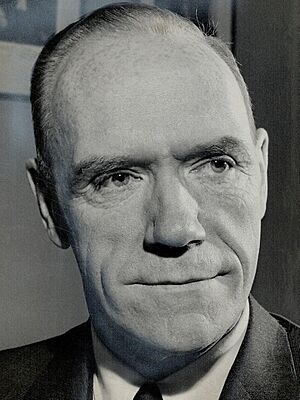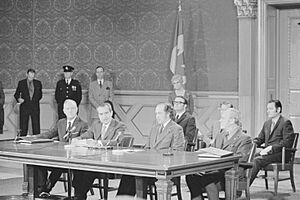Mitchell Sharp facts for kids
Quick facts for kids
Mitchell Sharp
|
|
|---|---|

Sharp, c. 1962
|
|
| Leader of the Government in the House of Commons | |
| In office 8 August 1974 – 13 September 1976 |
|
| Prime Minister | Pierre Trudeau |
| Preceded by | Allan MacEachen |
| Succeeded by | Allan MacEachen |
| President of the Privy Council | |
| In office 8 August 1974 – 13 September 1976 |
|
| Prime Minister | Pierre Trudeau |
| Preceded by | Allan MacEachen |
| Succeeded by | Allan MacEachen |
| Secretary of State for External Affairs | |
| In office 20 April 1968 – 7 August 1974 |
|
| Prime Minister | Pierre Trudeau |
| Preceded by | Paul Martin Sr. |
| Succeeded by | Allan MacEachen |
| Minister of Finance | |
| In office 18 December 1965 – 19 April 1968 Acting: 11 November 1965 – 17 December 1965 |
|
| Prime Minister | Lester B. Pearson |
| Preceded by | Walter L. Gordon |
| Succeeded by | Edgar Benson |
| Minister of Trade and Commerce | |
| In office 22 April 1963 – 3 January 1966 |
|
| Prime Minister | Lester B. Pearson |
| Preceded by | Malcolm Wallace McCutcheon |
| Succeeded by | Robert Winters |
| Member of Parliament for Eglinton |
|
| In office 8 April 1963 – 1 May 1978 |
|
| Preceded by | Donald Fleming |
| Succeeded by | Rob Parker |
| Personal details | |
| Born |
Mitchell William Sharp
11 May 1911 Winnipeg, Manitoba, Canada |
| Died | 19 March 2004 (aged 92) Ottawa, Ontario, Canada |
| Political party | Liberal |
| Spouses |
|
| Alma mater | |
| Profession |
|
Mitchell William Sharp (May 11, 1911 – March 19, 2004) was an important Canadian politician. He was known for being a Liberal Cabinet minister. He worked in both government and private business during his long career.
Contents
Early Life and Education
Mitchell Sharp was born in Winnipeg, Manitoba. He studied at the University of Manitoba, earning his first degree in 1934. He continued his studies there and later at the London School of Economics in England. During this time, he wrote about the grain trade, which is about buying and selling crops like wheat.
Sharp began working for the government in 1942. He joined the Department of Finance, which manages Canada's money. By 1947, he was in charge of the department's Economic Policy Division. From 1951 to 1957, he helped lead the Department of Trade and Commerce. Here, he was responsible for how Canada traded with other countries. He also briefly served as the top official in that department.
Political Career
In 1963, Mitchell Sharp was elected as a Member of Parliament (MP). He represented the area of Eglinton. Soon after, he became the Minister of Trade and Commerce. This role involved looking after Canada's business and trade.
From 1965 to 1968, Sharp served as the Minister of Finance. This is a very important job, as the Minister of Finance manages the country's budget and economy. He also held other key government positions:
- Secretary of State for External Affairs (1968–1974): This role is like being the foreign minister, dealing with Canada's relationships with other countries.
- President of the Privy Council (1974–1978): This position involves advising the Governor General and overseeing government operations.
- Leader of the Government in the House of Commons (1974–1978): This person helps manage the government's business in Parliament.
Sharp decided to leave Parliament in 1978.
Views on Canada's Head of State
Mitchell Sharp believed that Canada should have its own head of state. He felt that having the same head of state as other countries made it seem like Canada was not fully independent. Because of these views, he chose not to accept an offer to become the Governor General. The Governor General is the King's representative in Canada.

Sharp also played a big part in making sure the Canadian Pavilion at Expo 67 was large and impressive. Expo 67 was a huge world's fair held in Montreal during Canada's 100th birthday. The Canadian Pavilion was originally planned to be much smaller.
Life After Politics
After leaving elected politics, Mitchell Sharp continued to serve the public. From 1978 to 1988, he was the commissioner of the Northern Pipeline Agency. This agency was created to help build a natural gas pipeline between the U.S. and Canada.
He also worked on a special group that looked at conflict of interest rules. This group published a report in 1984 about how public officials should act ethically. Sharp was also involved with the Trilateral Commission, a group that discusses global issues. From 1993 to 2003, he was a personal advisor to Prime Minister Jean Chrétien. He took only one dollar a year for this important job.
Mitchell Sharp passed away on March 19, 2004, at the age of 92. He is buried in Ottawa.
Honours and Awards
Mitchell Sharp received many honours for his service to Canada.
- He became a member of the Queen's Privy Council for Canada in 1963. This gave him the title "The Honourable."
- He was made an Officer of the Order of Canada in 1984, and later a Companion of the Order of Canada in 1999. The Order of Canada is one of the highest honours a Canadian can receive.
- He also received medals like the Canadian Centennial Medal (1967), the Queen Elizabeth II Silver Jubilee Medal (1977), the 125th Anniversary of the Confederation of Canada Medal (1992), and the Queen Elizabeth II Golden Jubilee Medal (2002).
Honorary Degrees
Mitchell Sharp was also given several honorary degrees from universities. These degrees recognized his important contributions to Canada.
- In 1965, he received a Doctor of Laws (LL.D) from the University of Manitoba.
- In 1977, he received a Doctor of Laws (LL.D) from the University of Western Ontario.
- In 1994, he received a Doctor of Laws (LL.D) from Carleton University.
- In 1995, he received a Doctor of Laws (LL.D) from McMaster University.
 | Audre Lorde |
 | John Berry Meachum |
 | Ferdinand Lee Barnett |

